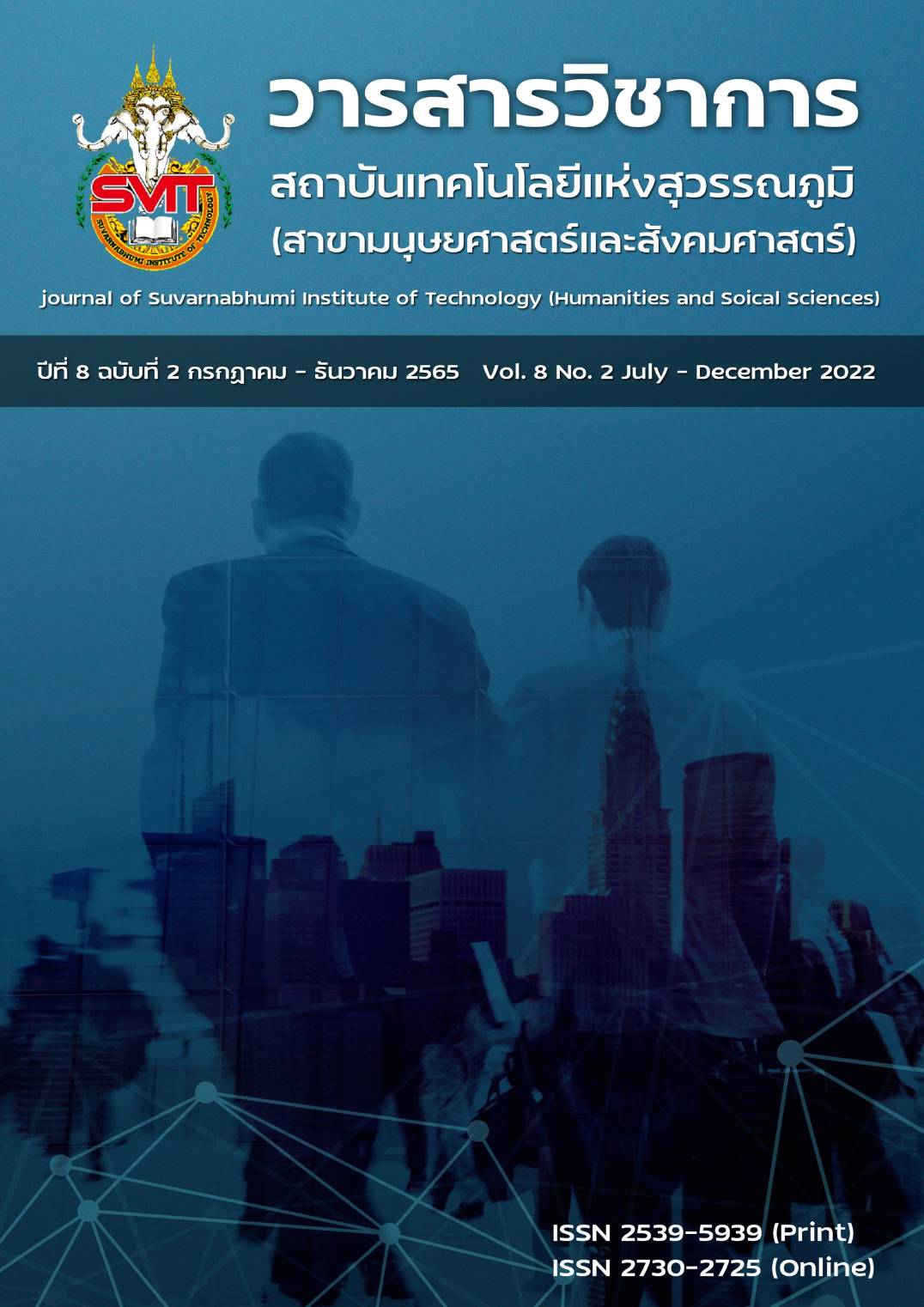EXCUTIVE ETHICAL LEADERSHIP AFFECTING THE MORALITY OF TEACHERS AND STUDENTS IN PRIVATE SCHOOL UNDER NAKHONPATHOM PROVINCIAL EDUCATION OFFICE
Keywords:
Moral of teachers and student, Ethical Leadership, Private School AdministratorsAbstract
The purposes of this research were to study (1) the ethical leadership of administrators in private school (2) the morality of teachers and students in private school and (3) the ethical leadership of administrators affecting the morality of teachers and students in private school under Nakhonpathom Provincial Education Office. The sample were 320 teachers, selected by simple random sampling. The research instrument used questionnaires which a reliability of .98. Data were analyzed using basic statistics such as mean, standard deviation and stepwise multiple regression analysis.
The finding were ; 1. The ethical leadership of administrators in private school overall there was a high level of practice. When considering the average from descending to each side being a person with rules, being a role model ethical, inspiring, honest and fair and cooperation there is a high level of practice. 2. Morality of Teachers and Students in Private School Overall there was a high level of practice. When considering the average from descending to each side morality and ethics of Thai people, moral ethics according to religious principles and human ethics there is a high level of practice. 3. The ethical leadership of administrators affecting the morality and ethics of teachers and students in private schools. statistically significant at the .05 level. The variables that have been selected into the equation was being a person with rules, collaborating and being an ethical role model were able to predict the impact on morality and ethics of teachers and students 54.10%
References
ชัยวัฒน์ อัตพัฒน์. (2550). จริยศาสตร์=Ethics (Moral Philosophy). กรุงเทพฯ: มหาวิทยาลัยรามคำแหง.
ณัฐวัชร จันทโรธรณ์. (2561). บทความภาวะผู้นำการเปลี่ยนแปลงเชิงจริยธรรมและวัฒนธรรมองค์การเชิงจริยธรรมกับประสิทธิผลของโรงเรียนในสังกัดสำนักงานเขตสายไหม. กรุงเทพฯ: สาขาวิชาการบริหารจัดการองค์การ มหาวิทยาลัยเกริก
ดวงเดือน พินสุวรรณ. (ม.ป.ป.). คุณธรรมจริยธรรมสำหรับครู. นนทบุรี: มหาวิทยาลัยสุโขทัยธรรมาธิราช
ดวงฤดี ศิริพันธุ์. (2558). ภาวะผู้นำเชิงจริยธรรมของผู้บริหารสถานศึกษาตามความคิดเห็นของครูโรงเรียนการกุศลของวัดในพระพุทธศาสนา สังกัดสำนักงานการศึกษาเอกชน จังหวัดสงขลา. การประชุมหาดใหญ่วิชาการระดับชาติและนานาชาติ ครั้งที่ 9 มหาวิทยาลัยหาดใหญ่ : 1161-1174.
ดาริณี สมศรี. (2559). ซื่อสัตย์: คุณธรรมพื้นฐาน. ชลบุรี: วิทยาลัยพยาบาลบรมราชชนนี
นพพงษ์ บุญจิตราดุล. (2557). หลักการและทฤษฎีการบริหารการศึกษา. (พิมพ์ครั้งที่ 3). กรุงเทพฯ: ตีรณสาร.
เนาวรัตน์ รอดเพียน. (2560). ภาวะผู้นำเชิงจริยธรรมที่ส่งผลต่อประสิทธิภาพการบริหารงานบุคลากรของโรงเรียนอาชีวศึกษาเอกชน เขตพื้นที่กรุงเทพมหานคร. (วิทยานิพนธ์ปริญญามหาบัณฑิต, มหาวิทยาลัยราชภัฏราชนครินทร์).
ปัญญา เล็กจันทร์อิ่ม. (2556). คุณลักษณะผู้บริหารที่ดี. สืบค้นจาก http://gotoknow.org/post/359072
ประภาวดี ทามนตรี. (2562). บทบาทความเป็นครูกับการสร้างแรงบันดาลใจในห้องเรียนเด็กประถม. วารสารครุศาสตร์ จุฬาลงกรณ์มหาวิทยาลัย, 47(2), 176-191.
ประสงค์ ทองประ ทวีศักดิ์ ทองทิพย์ บรรจง โสดาดี และธนู ศรีทอง. (2553). การศึกษาแนวทางแก้ปัญหาการขาดคุณธรรมจริยธรรมของนักศึกษาระดับอุดมศึกษา ในเขตจังหวัดสุรินทร์. รายงานการวิจัยทุนอุดหนุนการวิจัยประจำปีงบประมาณ 2547 มหาวิทยาลัยมหาจุฬาลงกรณราชวิทยาลัย.
พนัส หันนาคินทร์. (2550). หลักการบริหารโรงเรียน. กรุงเทพฯ: วัฒนาพานิช.
พระธรรมปิฎก (ป.อ.ยุตโต). (2540). พระพุทธศาสนาพัฒนาคนและสังคม. กรุงเทพฯ: กรมการปกครอง.
พระมหาอนันต์ องฺกุรสิริ. (2561). คุณธรรมจริยธรรมกับการพัฒนาผู้เรียนในยุคไทยแลนด์ 4.0. ใน การประชุมวิชาการระดับชาติ MCU Congress II 2561 มหาวิทยาลัยมหาจุฬาลงกรณ์ราชวิทยาลัย.
พระอัครเดช ญาณเตโช. (2557). หน้าที่พลเมืองตามแนวทางพุทธศาสนา. สืบค้นจาก https://www.stou.ac.th/study/sumrit/5-58(500)/page2-5-58(500).html
พวงพยอม คำมุง. (2557). ความหมายของ “คุณธรรม” และ “จริยธรรม”. น่าน: ฝ่ายส่งเสริมและเผยแพร่การประชาสัมพันธ์ ส่วนแผนงานและพัฒนางานประชาสัมพันธ์ สปข. 3.
ภูเบศร์ สมุทรจันทร์. (2552). Inspiration… พลังแห่งลมหายใจ ไฟในการทำงาน. Productivity World, 20-23.
สัมมา รธนิธย์. (2556). หลัก ทฤษฎี และปฏิบัติการบริหารการศึกษา. (พิมพ์ครั้งที่ 4). สุรินทร์: รุ่งธนเกียรติออฟเซ็ท.
สิวลี ศิริไล. (2550). จริยศาสตร์สำหรับพยาบาล. (พิมพ์ครั้งที่ 8). กรุงเทพฯ: จุฬาลงกรณ์มหาวิทยาลัย.
สุเทพ พงศ์ศรีวัฒน์. (2550). ภาวะความเป็นผู้นำ: เอกสารตำราหลักประกอบการเรียนการสอน หลักสูตรรัฐประศาสนศาสตรบัณฑิต สาขาการปกครองท้องถิ่น วิชาภาวะความเป็นผู้นำ. กรุงเทพฯ: เอ็กซเปอร์เน็ท.
สุพิศ ศรีบัว. (2564). คุณลักษณะผู้นำของผู้บริหารสถานศึกษาเอกชน. วารสาร มจร อุบลปริทรรศน์, 6(1), 619-635.
หนูไกร มาเชค. (2559). การพัฒนาภาวะผู้นำเชิงจริยธรรมในผู้บริหารสถานศึกษา สังกัดสำนักงานคณะกรรมการการศึกษาขั้นพื้นฐาน. (วิทยานิพนธ์ปรัชญาดุษฎีบัณฑิต, มหาวิทยาลัยบูรพา).
อชิรญาณ์ แย้มทับ. (2562). ความสามารถทางภาวะผู้นำเชิงจริยธรรมของผู้บริหารที่ส่งผลต่อประสิทธิผลของสถานศึกษา สังกัดสำนักงานเขตพื้นที่การศึกษาประถมศึกษานนทบุรี. (วิทยานิพนธ์ปริญญามหาบัณฑิต, มหาวิทยาลัยสุโขทัยธรรมาธิราช).
อัญชลี มีบุญ. (2562). คุณธรรม จริยธรรมสำหรับผู้บริหารที่สอดคล้องกับการปกครองในองค์กรภาครัฐ. Veridian E-Journal, Silapakorn University ฉบับภาษาไทย สาขามนุษยศาสตร์ สังคมศาสตร์ และศิลปะ, 11,(3), 1399-1408.
อาคม มากมีทรัพย์. (2557). จริยธรรมผู้บริหารสถานศึกษา. สุทธิปริทัศน์, 28(87), 304-322.
Brown, M. E., Treviño, L. K., & Harrison, D. A. (2005). Ethical leadership: A social learning perspective for construct development and testing. Organizational behavior and human decision processes, 97(2), 117-134.
Burns, J. M. (1978). Leadership. New York: Harper and Row.
Dubrin, A. J. (2004). Leadership: Research Findings, Practice and Skill. (4th ed.). New York: Houghton Mifflin.
Hoy, W.K. & Miskel, C. G. (2001). Educational Administration: Theory, Research and Practice. (6th ed.). New York: McGraw-Hill International.
Kalshoven, K. (2010). Ethic Leader Behavior and Big Five Factors of Personality. Journal of Business Ethics, 100(2), 349-366.
Krejcie, R.V. & Morgan, D.W. (1970). Determining Sample Size for Research Activities. Educational and Psychological Measurement, 30, 607-610.
Sergiovanni, T. J. (1992). Moral leadership: Getting to the heart of school improvement. San Francisco, CA: Jossey-Bass.
Taylor, F. W. (2002). The Principles of Scientific Management. New York: Harper.
Downloads
Published
Issue
Section
License
Copyright (c) 2022 Suvarnabhumi Institute of Technology

This work is licensed under a Creative Commons Attribution-NonCommercial-NoDerivatives 4.0 International License.
The articles published are copyrighted by the Sarasas Journal of Humanities and Social Science. The opinions expressed in each article in this academic journal are those of the individual authors and do not reflect the views of Sarasas Suvarnabhumi Institute of Technology. The authors are solely responsible for all aspects of their respective articles. Any errors or inaccuracies in the articles are the sole responsibility of the authors.



